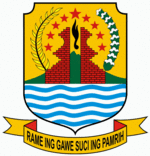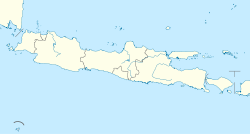Cirebon Regency
|
Cirebon Regency Kabupaten Cirebon |
|
|---|---|
| Other transcription(s) | |
| • Sundanese | ᮊᮘᮥᮕᮒᮦᮔ᮪ ᮎᮤᮛᮨᮘᮧᮔ᮪ |
| • Hanacaraka | ꦏꦧꦸꦥꦠꦺꦤ꧀ꦕꦶꦫꦺꦧꦺꦴꦤ꧀ |

Cirebon Regency Logo
|
|
| Motto: Rame Ing Gawe Suci Ing Pamrih (High in Efforts, Chaste in Rewards) |
|
 Location within West Java |
|
| Location in Java and Indonesia | |
| Coordinates: 6°45′51″S 108°28′44″E / 6.7641°S 108.4789°ECoordinates: 6°45′51″S 108°28′44″E / 6.7641°S 108.4789°E | |
| Country | Indonesia |
| Province | West Java |
| Government | |
| • Regent | Sunjaya Purwadi Sastra |
| • Vice Regent | Tasiya Sumadi |
| Area | |
| • Total | 990.36 km2 (382.38 sq mi) |
| Population (2015) | |
| • Total | 2,126,179 |
| • Density | 2,100/km2 (5,600/sq mi) |
| Time zone | Indonesia Western Time (UTC+7) |
| Area code(s) | +62 231 |
| License plate | E |
| Website | Local Government Site |
Cirebon Regency is a regency (kabupaten) of West Java, Indonesia. Sumber is its capital. The area and population excludes those of Cirebon City, which is an independent administration, although totally surrounded by the regency on its landward side.
The Cirebon region is renowned for the production of various types of mangoes. There are plans to support the expansion of mango production in the region both for export as well as for the domestic market. Mango production is currently concentrated in just a few parts of the regency. Local farmers and officials believe there is considerable potential to expand production to other nearby parts of the locality.
According to the manuscript Purwaka Caruban Nagari, in 15th century Cirebon started as a small fishing village named Muara Jati. At that time the port of Muara Jati already attracted foreign traders. The port master at that time is Ki Gedeng Alang-Alang whose appointed by the king of Galuh kingdom located inland in Kawali, Ciamis. He moved the port to Lemahwungkuk, 5 kilometres southward. As the new settlement leader, Ki Gedeng Alang-Alang was bestowed the title "Kuwu Cerbon" (Cerbon village leader).
A 15th century prince from Pajajaran, Prince Walangsungsang, converted to Islam, and was appointed as the Adipati (Duke) of Cirebon with the title Cakrabumi. He established the new kingdom of Cirebon and declared independence from Sunda and Galuh. The establishment of Cirebon Sultanate marked the first Islamic rule in Western Java, that grew from modest fishing village of Muara Jati to a busy port of Java northern coast. Cirebon grew as one of the independent sultanates under the leadership of Sunan Gunungjati, in the early 16th century.
After the Sunda Kingdom collapsed, The Sultanates of Banten and Mataram fought control over Cirebon, which declared its allegiance to Sultan Agung of Mataram. But the later his grandson Amangkurat II ceded the city to the Dutch in the 1677. A treaty in 1705 saw the Cirebon area west of Cisanggarung River became a Dutch protectorate jointly administered by three sultans whose courts rivalled those of Central Java. The Dutch authorities later established the Cirebon Residence (Residentie Tjirebon) which composed of present-day Cirebon, Indramayu, and Kuningan.
...
Wikipedia


